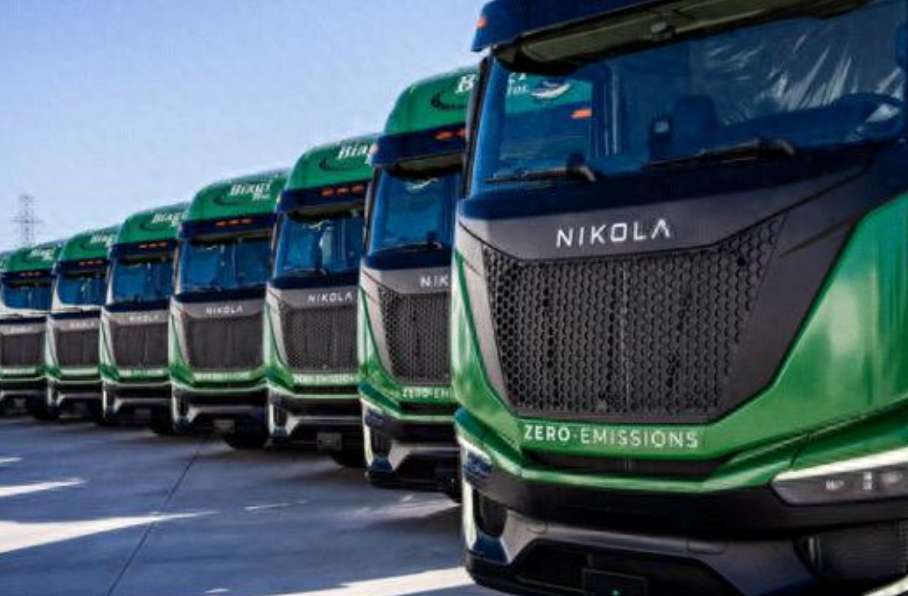Nikola's Market Value Plummets to Billions
Advertisements
The rise and fall of ambitious ventures often serves as a cautionary tale in the fast-paced world of technology and innovation. Recently, the American hydrogen-powered electric truck manufacturer Nikola Corporation, once heralded as the next Tesla for the trucking industry, has been falling from grace, with rumors of impending bankruptcy emerging. This shift marks the collapse of a once-prominent figure in the automotive sector, invoking reflection on both corporate governance and strategic foresight.
Founded with dreams of revolutionizing transportation, Nikola aimed to disrupt the conventional diesel truck market. The company's stock performed brilliantly in its early days, peaking at a valuation of nearly $30 billion following its public listing in June 2020. At that time, Nikola attracted attention not just for its technologies but for its vision of a sustainable future powered by hydrogen fuel cells and battery technologies. The founders imagined a fleet of eco-friendly trucks that could reshape logistics and transportation, a narrative that captivated investors.
However, like a porous bubble, the gaudy valuation soon gave way to scrutiny. In September 2020, Hindenburg Research, a financial analysis firm notorious for revealing corporate frauds, published a report that alleged Nikola to have significantly misrepresented its technological capabilities. The report included accusations that Nikola had misled investors about its hydrogen-powered trucks, claiming that some promotional videos were misleadingly staged. Those defenses crumbled under investigation, revealing systemic flaws in both product development and corporate communications.
This revelation was akin to pulling the thread of a woolen sweater, causing the entire fabric of Nikola’s reputation to unravel. Founder Trevor Milton’s resignation came swiftly in the aftermath, and the company faced a litany of class-action lawsuits from aggrieved investors. By this time, Nikola's stock had plummeted more than 90 percent from its peak, losing billions in market capitalization almost overnight. The testimonials from early investors turned to stories of regret, emphasizing the importance of due diligence in a landscape rife with speculative investment.
The downfall did not halt with Milton’s departure. The repercussions continued to haunt Nikola as its business model began to falter. The promise of hydrogen-powered trucks, which at one point seemed revolutionary, instead exposed the limitations and hurdles associated with alternative fuels. The availability of infrastructure, the high costs associated with hydrogen production, and the length of time taken to bring products to market became evident weaknesses. Data from industry analysts indicated that the path to market maturity for hydrogen technologies was more than a decade away, casting doubt on Nikola’s trajectory.

By 2023, internal documents painted a grim picture highlighting cash reserves dwindling perilously low, enough to sustain operations only until early 2024. Facing insurmountable losses—reported at $481 million in the first three quarters of 2024 alone—and a substantial debt burden, the company’s executives found themselves at a crossroads. Nikola’s initial flair for fundraising had turned into an uphill struggle for survival. As the company’s liquidity dwindle, the inevitability of bankruptcy loomed large, leading to an exploration of options that included potential asset sales and reorganization strategies.
The narrative is strikingly reminiscent of other electric vehicle startups that have come and gone within a few short years. Companies like Lordstown Motors and Canoo have also filed for bankruptcy protection, underscoring an unsettling trend in the eco-automobile sector. Once heralded as harbingers of change, these manufacturers often found themselves cash-strapped and unable to deliver on their lofty promises. The automotive revolution driven by electrification appeared more akin to a high-stakes gamble, with many firms falling by the wayside due to insufficient planning, inadequate cash flow, or simply an oversaturation of competition.
Central to the discourse surrounding Nikola—and indeed many startups—is the increasing pressure to innovate quickly within an investor climate that prioritizes rapid return on investment. A notable aspect of the Nikola saga lies in how its leadership opted for bold proclamations in lieu of demonstrable progress. Given the broader challenges of bringing alternative fuel technologies—such as hydrogen—to market, adherence to transparency and accountability became imperative for sustaining investor confidence.
Furthermore, the repercussions of Nikola’s downfall extend into the realm of consumer trust and regulatory examination. The United States Securities and Exchange Commission (SEC) scrutinized Nikola closely, eventually leading to substantial penalties for allegations of misleading disclosures. Such scrutiny is vital; it signals an industry bearing the weight of stakeholder scrutiny, emphasizing responsibility from founders to investors.
Indeed, the age of innovation in the automotive sector—as witnessed with electric vehicles—has an accompanying cost burden. The capital-intensive nature of developing new technologies can often yield a challenging investment landscape. A swath of electric vehicle startups embraced the traditional venture capital model aiming for rapid scaling, yet many founders underestimated the importance of scaling sustainably. The fallout faced by Nikola serves as a reminder that while ambition drives innovation, it is the grounded execution of business strategy that ultimately determines success or failure.
Despite Nikola’s trials, the conversation surrounding hydrogen technology remains pertinent. The automotive industry is at a pivotal junction, tasked with balancing the technological demands of the future while being scrutinized by an increasingly aware public. This inevitability may prompt governmental bodies and regulatory agencies to implement more robust frameworks to navigate the nuances of corporate accountability within startup culture.
In conclusion, as the dust begins to settle on Nikola's troubling saga, future entrepreneurs and investors must absorb the lessons. Success is not solely predicated upon lofty goals, but on the intricate balance of ambition with operational integrity and accountability. For investors particularly, discernment is paramount, ensuring that enthusiasm does not cloud judgment when it comes to evaluating opportunities in an ever-evolving marketplace. As the narrative continues to unfold, the saga of Nikola embodies pivotal lessons in ethics, sustainability, and oversight in the realm of electric vehicle technology—a cautionary tale for the future of innovation.
Leave a Comment